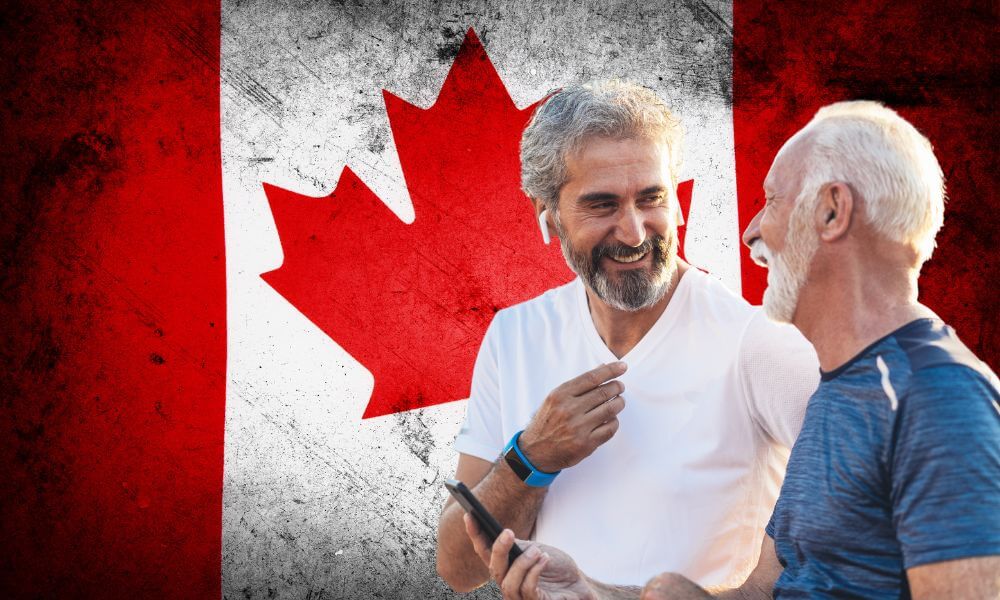Canadians almost universally use the word “buddy” as the most common alternative to friend. Other slang terms such as “pal”, “bro,” and “dude” are also very broadly used in Canada to call your friends. While most of its slang terms for friend are shared with the U.S., “buddy” is used far more in Canada.
The most likely term you’ll hear, then, is “buddy”.
This is universal in Canada and above all has become the stereotypical way to refer to your friend in Canadian slang.
That said, like most words for friend in any slang, it doesn’t have to be someone who is literally a close friend.
It can be a polite way to refer to a stranger!

What do Canadians call their friends?
The most common way that Canadians refer to their friends is as “buddy”.
This will depend somewhat on the part of Canada you’re in—naturally, French-speaking Canadians don’t really use this term all that much.
Other than that, though, pretty much everywhere in Canada, this is the most widely used term for friend.
As will become a theme with these words, it’s always important to remember that “buddy” means “friend,” but “friend” doesn’t always have to mean someone you actually know well.
It can just be a polite and friendly way to interact with someone in the street, or in a store, and so on. Buddy, too, is by far the most common term for this.
Other than that, there are a variety of terms that Canadians use across the board to refer to their friends.
Perhaps the next most common is “pal”, again universally used and understood if less commonly than buddy.
As with buddy, a “pal” could either be your closest friend or someone you’ve just passed in the street.
Most of the terms we tend to associate with North Americans in general are also in very common use in Canada.
“Bro” is an extremely popular term among younger men, but it’s also widely used by women as well. It does have a certain connotation of being a college-fraternity man type term, but it’s got a broader application than that; if not as broad as “buddy”.
Similarly, “dude” is also a commonly used term among younger and older men to refer to their friends in Canada.
Again, it is also used by women, to a lesser extent.
This is very similar to “bro” in the sense of its demographic, but also in that both can be a close friend or a friendly way to talk to someone you don’t know.
Why do Canadians say buddy?
So, how did Canadians end up being the ones to say “buddy” the most?
Well, there are a few potential theories. The word itself, as you might have guessed, is very old. It traces its origins back at least as far as the 19th Century, in the written record, and is no doubt much older still than that.
Originally, it was how miners would refer to their friends, perhaps as a variant of “brother” or of “butty” (meaning sandwich). This was originally a U.S. slang term.
It’s thought that it then caught on in Newfoundland, among other places, and spread from there to the rest of Canada.
It is said that the Atlantic Provinces, like Newfoundland and Nova Scotia, are where you’re most likely to hear “buddy” or “bud”, so it probably started among laborers there.
Why do Canadians say pal?
“Pal” has a very interesting and perhaps unexpected history.
It was first recorded in English use in the 18th Century, or towards the end of the 17th.
It’s said to have originally derived from a Romani word, where “pal” just meant a brother or comrade.
When and how this spread to Canada is not entirely clear, but it probably gained true popularity in the 19th Century.
Since then, it has gained enormous traction and become one of the most popular slang terms for friend in the country.
Why do Canadians say bro?
Bro is another very common one among a certain demographic in Canada.
It certainly isn’t used by everyone. Its origin, also, is fairly simple and straightforward.
Originally just an abbreviation of “brother” in the 19th Century, and would only refer to your actual blood brothers, it changed its sense in the beginning of the 20th Century.
Then, it came to simply mean a close friend, and now can also be used to mean a close friend or just be a way to refer to someone you don’t know.
Why do Canadians say dude?
Finally we have dude, just as common in Canada as it is in the United States.
Originally, “doodle” denoted a “dandy”, a rich and well-to-do male of a certain age.
This was possibly derived from “doodle,” with allusions to Yankee Doodle Dandy, an extremely popular song during the War of Independence and ever since in America.
It took on the sense of “dude” in the 19th Century, coming to mean just any male person.
Eventually, by modern standards, it came to mean just any person and particularly your friend.
So, as you can see, slang terms like those for friend tend to get passed around a lot between English speaking nations.
Canada is no different, but it has nonetheless taken its slang and made it its own.
“Buddy” is perhaps associated with Canada now more than any other country, and with good reason.
But it’s not the only option!
More in Canadian Slang
- Canadian Slang For Beer (9 Examples!)
- Canadian Slang For Cigarettes (Explained!)
- Canadian Slang For Drunk (28 Examples!)
- Canadian Slang For Friend (Helpful Content)
- Canadian Slang For Hello (Explained!)
- Canadian Slang For Hot Girl (Helpful Content)
- Canadian Slang For Money (Explained!)
- Canadian Slang For No (Helpful Content)
- Canadian Slang For Snowmobile (Helpful Content)
- Canadian Slang For Yes (Explained!)

